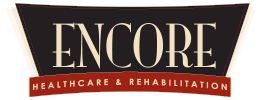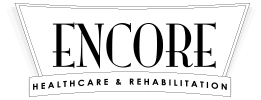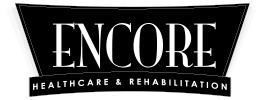
Payer Sources

Encore accepts Medicaid, Medicare, third-party insurance, and private funds.
When touring our Encore community, you will have the opportunity to speak with our qualified biller who can answer your questions and help guide you through the process.
MEDICAID
Medicaid is a federally subsidized State program for people with limited financial resources. It could cover the cost of long-term nursing and personal care, including a semi-private room and meals.

DO I QUALIFY FOR MEDICAID?
It’s up to the State to determine who qualifies for Medicaid assistance. The steps the State generally takes to assess qualification include:
- A detailed analysis over the past several years of money and assets the applicant held, owned, sold, gifted, and/or transferred ownership.
- Assessment of one’s current reoccurring income. Most states will scrutinize financial records and transactions over the past 5 years; however, they can look back as long as they feel necessary.
- States will allow Medicaid recipients to have one home and one car of reasonable value, a burial plot, a prepaid funeral plan, and a minimal amount of cash or savings.
- If an applicant is approved for Medicaid benefits, the State will determine, based on the applicant’s reoccurring income, the amount owed to the long-term care facility each month by the individual. Medicaid will then cover the remaining charges owed to the facility.
MEDICARE
Medicare is a federal program for people who are 65 or older and younger people with disabilities or with irreversible kidney failure who need dialysis or a transplant. It could cover the cost of skilled nursing and rehabilitation services, including a semi-private room, meals, and other medically-necessary services and supplies for up to 100 days in a long-term care facility.

DO I QUALIFY FOR MEDICARE?
Here is an overview of the restrictions and general steps taken to assess qualification for Medicare assistance:
- A mandatory three-day minimum medically-necessary inpatient hospital stay for illness or injury. An inpatient hospital stay begins the day the patient is formally admitted into the hospital with a doctor’s order, but does not include the day of discharge.
- To qualify for care in a skilled nursing facility, one’s doctor must clarify that daily skilled care like physical therapy or intravenous injections are needed.
- The maximum days Medicare will cover in a skilled nursing facility is 100, although, the facility may be required to discontinue Medicare benefits prior to day 100 if at any point one’s condition ceases to improve, or if one meets predetermined goals set by the facility.
- Of those 100 days, Medicare will cover 100% of the charges for the first 20; however, a co-payment is required for days 21 through 100.
- Medicare does not cover long-term care or custodial care, so if one decides to remain in a long-term care facility after Medicare benefits are discontinued or exhausted, other methods of payment will be required.
THIRD PARTY INSURANCE
Third Party Insurance coverage depends on the type of policy carried. It could cover the cost of a stay in a nursing facility within the policy parameters below:
- Medicare replacement and managed care policies may cover a short-term stay for skilled nursing care and/or rehabilitation services.
- Long-term care policies may cover a long-term stay in a facility when skilled nursing or rehabilitation services are not required.
The specific terms of each policy are different, so it is important to understand that deductibles, copayments, and non-covered charges may be owed to the nursing facility by the policy holder. To avoid any unexpected costs, we strongly encourage you to completely understand the terms and conditions of you or your loved one’s insurance policy before being admitted into any nursing facility.
PRIVATE FUNDS
Money paid directly by individuals in the form of cash, check, card or money order.


